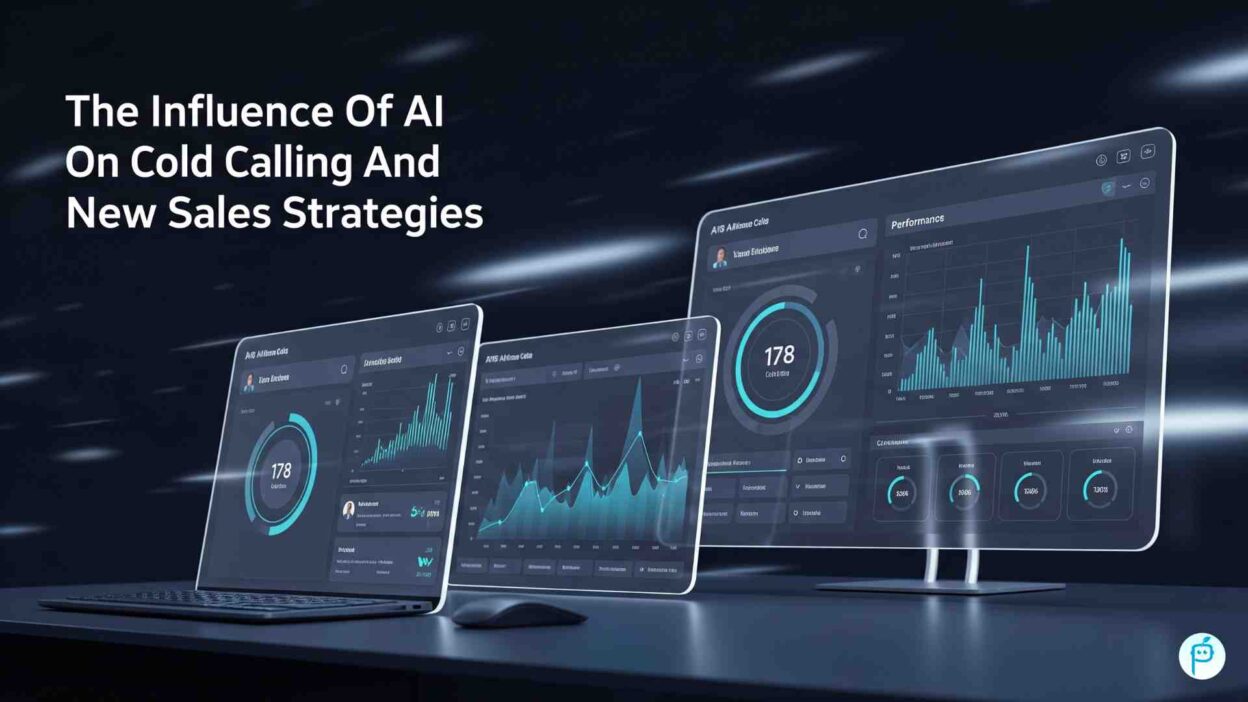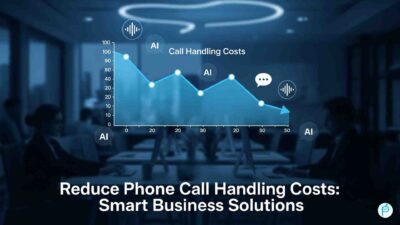Cold calling has transformed dramatically in recent years. Artificial intelligence drives this transformation. Sales teams embrace new technologies. Traditional methods evolve rapidly.
Table of Contents
Modern sales professionals need updated strategies. AI tools provide powerful capabilities. Customer interactions become more personalized. Success rates improve significantly.
This guide explores AI’s impact on cold calling. You’ll discover new sales strategies. Learn how technology reshapes prospecting. Understand future trends in sales.
Understanding AI On Cold Calling Fundamentals
Cold calling remains essential for business growth. AI enhances traditional approaches. Technology eliminates guesswork. Data-driven insights guide conversations.
Smart algorithms analyze prospect behavior. Calling times get optimized automatically. Success patterns emerge from data. Rejection rates decrease substantially.
AI systems learn from every interaction. Conversation quality improves over time. Personalization becomes standard practice. Sales efficiency increases dramatically.
Machine learning identifies qualified prospects. Lead scoring happens automatically. Time investments focus on promising opportunities. Conversion rates improve consistently.
How AI Transforms Traditional Cold Calling
Predictive Analytics for Better Timing
AI systems predict optimal calling times. Historical data reveals prospect availability. Behavioral patterns guide scheduling decisions. Success rates increase significantly.
Weather data influences calling strategies. Economic indicators affect decision-making. Industry trends impact prospect receptiveness. Seasonal patterns guide campaign timing.
Real-time analysis adjusts calling schedules. Peak performance windows get identified. Productivity metrics improve measurably. Sales teams work more efficiently.
Intelligent Lead Scoring
Automated systems evaluate prospect quality. Multiple data points create comprehensive scores. High-value leads get priority attention. Resources focus on best opportunities.
Social media activity provides insights. Website behavior reveals interest levels. Email engagement indicates readiness. Purchase history predicts future needs.
Dynamic scoring updates continuously. New information refines assessments. Prospect rankings adjust automatically. Sales priorities stay current.
Conversation Intelligence
AI analyzes call recordings automatically. Successful conversation patterns get identified. Winning phrases become templates. Objection handling improves systematically.
Voice tone analysis reveals prospect emotions. Sentiment tracking guides conversation direction. Engagement levels indicate interest. Decision-making signals get recognized.
Real-time coaching supports sales representatives. Suggested responses appear during calls. Objection answers get provided instantly. Confidence levels increase dramatically.
AI-Powered Sales Tools and Technologies
Automated Dialing Systems
Smart dialing platforms optimize calling efficiency. Predictive algorithms determine dialing rates. Connection rates improve substantially. Idle time decreases significantly.
Voice recognition identifies answering machines. Human conversations get prioritized. Callback scheduling happens automatically. Productivity increases measurably.
Call routing connects prospects with appropriate representatives. Skill-based matching improves outcomes. Geographic routing reduces costs. Language matching enhances communication.
CRM Integration and Automation
Customer relationship management systems sync with AI tools. Prospect data updates automatically. Interaction history stays current. Follow-up tasks get scheduled systematically.
Pipeline management becomes automated. Stage progression happens naturally. Opportunity scoring guides priorities. Forecasting accuracy improves dramatically.
Contact enrichment provides additional information. Social profiles get attached automatically. Company details update continuously. Conversation context improves significantly.
Voice AI and Natural Language Processing
Voice recognition technology transcribes calls automatically. Conversation analysis happens in real-time. Key topics get identified instantly. Action items emerge naturally.
Natural language processing understands prospect responses. Sentiment analysis guides conversation flow. Buying signals get recognized immediately. Objections receive appropriate responses.
Automated follow-up messages get generated. Personalized emails reflect conversation content. Meeting requests include relevant details. Proposal language matches discussed needs.
Data-Driven Prospecting Strategies
Behavioral Analysis for Prospect Identification
AI systems analyze digital footprints. Website visits indicate interest levels. Content consumption reveals priorities. Social media activity shows engagement patterns.
Purchase history predicts future needs. Budget cycles guide timing strategies. Decision-making processes get mapped. Stakeholder influence gets identified.
Competitive intelligence informs approaches. Market positioning guides messaging. Industry trends shape conversations. Economic factors influence timing.
Personalization at Scale
AI On Cold Calling enables mass personalization. Individual prospect research happens automatically. Custom messages get generated systematically. Relevant talking points emerge naturally.
Industry-specific insights guide conversations. Company news provides conversation starters. Recent achievements create connection opportunities. Mutual connections get identified.
Personalized value propositions match prospect needs. Solution positioning reflects specific challenges. ROI calculations use actual business metrics. Implementation timelines consider company factors.
Multi-Channel Orchestration
AI coordinates multiple communication channels. Email sequences complement calling efforts. Social media engagement supports relationship building. Content sharing provides value.
Channel preference analysis guides strategy. Prospect behavior determines optimal touchpoints. Response patterns shape follow-up approaches. Engagement levels influence frequency.
Campaign orchestration maintains consistent messaging. Brand voice stays uniform across channels. Timing coordination prevents overlap. Message sequencing tells coherent stories.
New Sales Strategies Powered by AI
Consultative Selling Enhancement
AI provides comprehensive prospect insights. Industry expertise gets delivered instantly. Market trends inform consultative approaches. Competitive landscape shapes positioning.
Problem identification becomes systematic. Pain point analysis guides questioning. Solution mapping happens automatically. Value proposition development uses data.
Needs assessment gets enhanced significantly. Questioning frameworks emerge from data. Discovery conversations improve naturally. Qualification accuracy increases dramatically.
Relationship-Based Selling
AI tracks relationship development progress. Interaction history guides future engagements. Preference patterns shape communication styles. Trust indicators get monitored continuously.
Stakeholder mapping happens automatically. Influence networks get identified. Decision-making processes become clear. Buying committee dynamics emerge.
Relationship scoring guides investment decisions. High-value relationships get prioritized. Maintenance activities get scheduled systematically. Relationship health gets monitored continuously.
Value-Based Selling Approaches
AI calculates precise value propositions. ROI models use actual business data. Cost-benefit analysis becomes sophisticated. Implementation impact gets quantified.
Business case development gets automated. Financial models reflect prospect specifics. Risk assessments consider industry factors. Success metrics align with business goals.
Pricing strategies adapt to value perception. Negotiation guidance reflects calculated worth. Proposal generation includes relevant metrics. Closing arguments use compelling data.
Overcoming Traditional Cold Calling Challenges
Reducing Rejection Rates
AI On Cold Calling significantly decreases rejection rates. Timing optimization increases connection probability. Message personalization improves reception. Relevance scoring guides approach selection.
Objection prediction prepares responses. Common concerns get addressed proactively. Resistance patterns get identified early. Conversation pivots happen naturally.
Rapport building gets enhanced systematically. Commonalities get identified automatically. Conversation starters emerge from data. Personal connections develop faster.
Improving Conversation Quality
AI provides real-time conversation guidance. Suggested questions appear during calls. Response templates get customized instantly. Objection handling improves dramatically.
Topic tracking ensures comprehensive coverage. Important points get highlighted automatically. Decision criteria get identified systematically. Buying signals receive appropriate responses.
Conversation flow optimization guides interactions. Natural transitions get suggested. Awkward pauses get eliminated. Professional demeanor gets maintained.
Enhancing Follow-Up Effectiveness
Automated follow-up systems maintain momentum. Personalized messages reflect conversation content. Scheduling coordination happens seamlessly. Commitment tracking ensures accountability.
Content recommendations match prospect interests. Educational materials get selected automatically. Case studies reflect similar situations. Testimonials address specific concerns.
Nurturing sequences guide relationship development. Touchpoint timing gets optimized. Message variety maintains engagement. Value delivery happens consistently.
Measuring AI Impact on Sales Performance
Key Performance Indicators
Connection rates improve with AI implementation. Conversation duration increases significantly. Appointment setting rates rise substantially. Qualified lead generation improves dramatically.
Conversion rates climb consistently. Sales cycle lengths decrease measurably. Deal sizes increase substantially. Revenue per representative grows significantly.
Activity efficiency improves markedly. Call quality scores rise continuously. Customer satisfaction increases substantially. Retention rates improve significantly.
ROI Analysis and Metrics
Technology investment payback periods shrink. Cost per lead decreases substantially. Customer acquisition costs drop significantly. Lifetime value calculations improve dramatically.
Productivity gains compound over time. Revenue growth accelerates consistently. Profit margins expand significantly. Competitive advantages emerge clearly.
Training costs decrease substantially. Onboarding time reduces significantly. Performance consistency improves dramatically. Team scalability increases substantially.
Continuous Improvement Frameworks
AI systems learn from every interaction. Performance optimization happens automatically. Strategy refinement occurs continuously. Results improvement accelerates over time.
A/B testing validates approach effectiveness. Data analysis guides strategy adjustments. Performance benchmarking ensures competitiveness. Best practice sharing accelerates adoption.
Feedback loops enhance system performance. User input guides feature development. Performance monitoring ensures optimal results. Continuous learning drives improvement.
Future of AI in Sales Development
Emerging Technologies
Voice synthesis technology creates realistic conversations. Deepfake detection ensures authenticity. Emotional AI reads prospect feelings. Quantum computing enables complex analysis.
Augmented reality enhances product demonstrations. Virtual reality creates immersive experiences. Blockchain technology ensures data security. Internet of Things provides behavioral insights.
Natural language generation creates personalized content. Computer vision analyzes visual cues. Predictive modeling forecasts outcomes. Machine learning adapts strategies automatically.
Integration Possibilities
AI On Cold Calling integrates with marketing automation. Sales and marketing alignment improves dramatically. Lead handoff becomes seamless. Campaign effectiveness increases substantially.
Customer service integration provides comprehensive insights. Support history informs sales approaches. Satisfaction data guides relationship management. Retention strategies improve significantly.
Financial system integration enables sophisticated analysis. Pricing optimization happens automatically. Revenue forecasting improves dramatically. Profitability analysis guides decisions.
Ethical Considerations
Data privacy protection remains paramount. Consent management follows regulations. Transparency maintains trust. Ethical guidelines govern implementation.
Bias prevention ensures fair treatment. Algorithmic fairness gets monitored continuously. Discrimination avoidance guides development. Inclusive practices promote equality.
Human oversight maintains accountability. AI decisions get reviewed regularly. Intervention capabilities remain available. Human judgment guides final decisions.
Implementation Best Practices
Technology Selection Criteria
AI platforms require careful evaluation. Feature sets must match business needs. Integration capabilities ensure smooth deployment. Scalability supports future growth.
Vendor reliability affects long-term success. Support quality influences adoption. Training availability accelerates implementation. Cost structure aligns with budgets.
Security features protect sensitive data. Compliance capabilities meet regulations. Performance monitoring ensures optimal results. Customization options match specific needs.
Training and Adoption Strategies
Sales team preparation ensures successful implementation. Skill development programs build confidence. Change management reduces resistance. Performance coaching accelerates adoption.
Pilot programs test effectiveness. Gradual rollout minimizes risks. Feedback incorporation improves results. Success measurement validates investment.
Continuous education maintains competency. Advanced training unlocks capabilities. Certification programs ensure proficiency. Knowledge sharing accelerates learning.
Change Management Considerations
Cultural transformation requires leadership support. Communication strategies address concerns. Resistance management guides implementation. Success stories motivate adoption.
Process documentation ensures consistency. Standard procedures guide actions. Quality assurance maintains standards. Performance monitoring ensures results.
Stakeholder engagement builds support. User feedback guides improvements. Recognition programs celebrate success. Continuous improvement drives excellence.
Read More: Voice Bot Training & Optimization: Boost Automation Performance
Conclusion

AI fundamentally transforms cold calling practices. Technology enables unprecedented personalization. Data-driven insights guide strategic decisions. Success rates improve dramatically.
Modern sales professionals embrace these changes. AI tools become essential capabilities. Competitive advantages emerge clearly. Revenue growth accelerates significantly.
Implementation requires careful planning. Technology selection needs thorough evaluation. Training programs ensure successful adoption. Change management guides transformation.
The future holds exciting possibilities. AI capabilities continue advancing. Integration opportunities expand rapidly. Innovation drives continuous improvement.
Sales teams that embrace AI On Cold Calling gain substantial advantages. Customer relationships improve significantly. Revenue performance increases dramatically. Market position strengthens considerably.
Start implementing AI solutions today. Your competition already explores these technologies. Early adoption provides competitive advantages. Success awaits those who act decisively.
The influence of AI on cold calling creates new opportunities. Sales strategies evolve continuously. Technology partnerships become essential. Future success depends on adaptation.






[…] Read More: The Influence Of Cold Calling And New sales Strategies […]
[…] Read More: The Influence Of AI On Cold Calling And New Sales Strategies […]
[…] Read More: The Influence Of AI On Cold Calling And New Sales Strategies […]
[…] ethical concerns, and compliance issues that didn’t exist a few years ago. Understanding AI cold calling compliance in 2025 is no longer optional. It is essential for any organization that wants to use AI effectively while […]
[…] Read More: The Influence Of AI On Cold Calling And New Sales Strategies […]